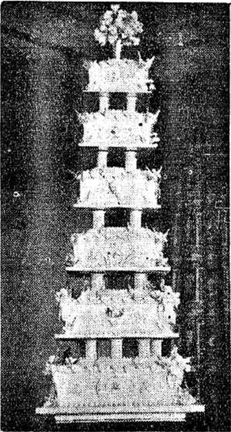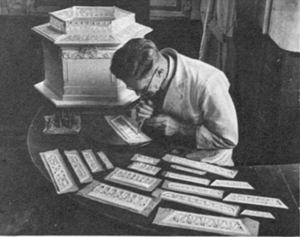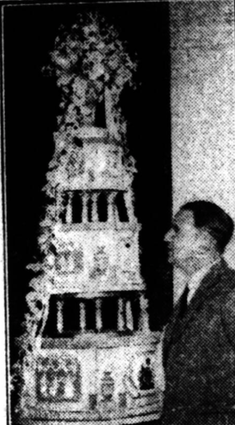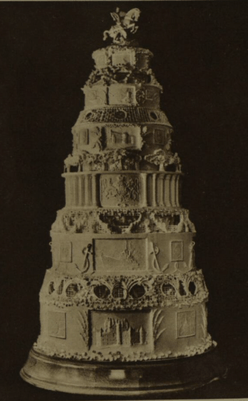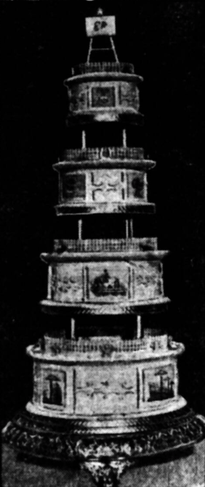Princess Elizabeth and Philip Mountbatten's wedding cakes facts for kids
Princess Elizabeth and Philip Mountbatten received many cakes for their wedding on November 20, 1947. People from all over the world sent them cakes! They chose to accept 12 of these special gifts. The main, official cake was baked by a Scottish company called McVitie and Price. The other 11 cakes came from famous bakeries and smaller family businesses. These cakes were shown off on strong tables in Buckingham Palace. After the wedding, they were given to charities. Princess Elizabeth even greeted each cake as it arrived at the Palace the day before her wedding!
Contents
- Many Wedding Cakes
- Food Shortages After the War
- Who Got the Cake?
- McVitie and Price: The Main Cake
- Bollands of Chester
- British Cake and Biscuit Manufacturers’ Association
- Country Women's Association of Australia
- Huntley and Palmer, Reading
- J Lyons and Co. London
- J W Mackie and Sons, Edinburgh
- Peek Freans & Co. London
- Real and Holton, Somerset
- Ulster Menu Company, Belfast
- Cake Replica Stolen
- Other Cake-Related Gifts
Many Wedding Cakes
Here are some of the businesses and groups that gave a wedding cake to Princess Elizabeth and Philip:
- Bollands Ltd, Chester
- British Cake and Biscuit Association
- Country Women's Association of Australia
- Huntley & Palmers Ltd, Reading
- J Lyons and Co. Ltd, London
- J W Mackie and Sons Ltd, Edinburgh
- McVitie and Price Ltd, Edinburgh
- Peek Freans and Co. Ltd, London
- Real and Holton, Somerset
- W F Robson
- W & R Jacob Ltd, Liverpool
- Ulster Menu Company Ltd, Belfast
Food Shortages After the War
After World War II, Britain had serious food shortages. This was called "post-War rationing." Because of this, the royal couple felt they couldn't accept more than 12 cakes. For example, when Queen Victoria got married in 1820, she received over 100 cakes!
Even as a princess, Elizabeth needed a special permit from the government to serve wedding cake. To help with the rationing, ingredients for some cakes came from Commonwealth countries. These included Australia, New Zealand, Canada, Jamaica, and Barbados. Princess Elizabeth wanted to "observe austerity conditions," meaning she wanted to be simple and not wasteful. So, the main cake was made much smaller than first planned. It had four layers, stood 2.7 meters (about 9 feet) tall, and weighed 226 kilograms (about 500 pounds). For comparison, her parents' wedding cake weighed 362 kilograms (about 800 pounds)!
Who Got the Cake?
The main McVitie and Price cake was eaten at the wedding party. The other 11 cakes were given to charities. These included hospitals and schools where the Princess was a leader or supporter. Staff at the royal homes also received cake. Some cake went to Broadlands, a large house where the couple spent the start of their honeymoon. Five hundred pieces of cake were given to the couple's friends.
The rest of the cake went to Girl Guides and Sea Rangers in Britain and Australia. The Girl Guides of Australia had given most of the ingredients for the main cake. One layer of the main cake was saved for the christening of Prince Charles in 1948.
McVitie and Price: The Main Cake
McVitie and Price, a famous biscuit maker, made the official four-layered wedding cake in their London factory. The Princess and Philip had visited their factory in Scotland earlier that year.
The cake's design was a secret until the wedding day. But on November 15, a few days before the wedding, special guests could see the cake at the factory. They watched Frederick E Schur, the head baker, add the final decorations. The day before the wedding, the huge cake was delivered to Buckingham Palace in a large moving van. A police officer and six men inside the van escorted it.
Ingredients from Australian Girl Guides
Because of rationing after the war, it was hard to find ingredients in Britain. Princess Elizabeth had recently become the Chief Ranger of the British Empire for the Girl Guides. So, 88% of the ingredients for the main cake were a gift from the Girl Guides of Australia! 25,000 Australian Brownies, Guides, and Rangers each gave one penny.
Lilian Gresham, a Girl Guide leader from Australia, said, "Australian Guides made this offer because they felt that the Princess was one of them." The ingredients were sent quickly. A request for help had only arrived in Australia the week before they were shipped.
The ingredients, listed in a 1947 Girl Guide magazine, included: 56 pounds of icing sugar, 70 pounds of castor sugar, 50 pounds of flour, 6 tins of powdered milk, spices, lemon essence, almond meal, and lots of dried fruits like sultanas, raisins, and cherries. They also sent Australian brandy, brown sugar, almond kernels, 12 dozen eggs, and 30 pounds of butter.
Seven crates of ingredients traveled to the UK on a ship called the SS Stratheden in August 1947. The shipping company even provided special refrigeration for the eggs and butter. The precious cargo arrived in London a month later. Princess Elizabeth's Lady-in-waiting, Lady Margaret Egerton, sent a thank-you letter. It said Her Royal Highness "deeply appreciated the thought which prompted the offer of this most generous and acceptable gift."
Other ingredients for the main cake came from different places. Flour came from Canada, and rum and brown sugar came from Jamaica. Because of all these ingredients from far away, the cake was nicknamed 'The 10,000 Mile Cake'. It also had 80 oranges and lemons, over 13 liters of Navy Rum, and curacao. The cake was left to mature for eight weeks after baking. It made 2,000 slices! McVitie and Price's recipe remained a secret, as the Princess wished.
South Africa's Offer
In July 1947, some people in South Africa wanted to provide the ingredients for the main cake. They thought ingredients were easier to get there. They even suggested baking the cake in South Africa and flying it to London. But this didn't happen. Most of the ingredients came from Australia instead.
Cake Decoration
The cake's four layers were held up by silver pillars. The bottom layer sat on a solid silver base, one meter (about 3 feet) wide. This same base had been used for the weddings of Princess Elizabeth's parents and grandparents. Each layer had different pictures and decorations:
- First layer (bottom): The bride's and groom's family symbols, Windsor Castle, Buckingham Palace, and Balmoral Castle.
- Second layer: A special box given to a Freeman of Windsor, Princess Elizabeth saluting as a military leader, a night scene from a naval battle (where Philip was in charge of searchlights), music symbols, and symbols for sports like tennis, cricket, sailing, athletics, and racing.
- Third layer: A cupid holding shields with the couple's initials, the symbol of the Royal Navy, the badge of the Auxiliary Territorial Service, and the badges of the Girl Guides and Sea Rangers. It also showed a painting of a ship called HMS Valiant.
- Fourth layer: Badges of Australia, Canada, South Africa, New Zealand, India, and Pakistan.
On top of the fourth layer was a globe showing the names of all the countries in the British Commonwealth. There was also a silver Quaich, which is a Scottish drinking cup, filled with fresh camellias and white roses.
Decorating the cake took five and a half weeks. Bakers made 700 separate sugar decorations and attached them to the cake. They also made many extra pieces in case of emergencies. Some of these decorations were carved by Vincent New, a designer from the Admiralty. He carved the designs into wax, and then these shapes were made into sugar.
Cutting the Cake
A section of cake from the bottom layer was pre-cut and marked with a ribbon. This made it easy to pull out a piece when the couple cut the cake. This special piece contained seven lucky charms: a bachelor button, a wedding ring, a donkey, a threepenny bit (an old coin), a thimble, a wish-bone, and a horseshoe. The couple cut the cake using the sword Philip had worn at the ceremony. The King had given him the sword as a wedding gift.
Recreating the Cake in 2016
In 2016, the Le Cordon Bleu School in London was asked by a TV company called ITV to recreate the main wedding cake. They agreed, and a show called "A Very Royal Wedding" aired in 2017. The school's head pastry chef, Julie Walsh, led the project. McVities helped by providing old records to show the cake's size and detailed decorations. The school first made a fake cake from polystyrene to check the size. The largest layer took 13 hours to bake!
McVitie and Price's original recipe was unknown, possibly lost in a factory fire. So, Chef Walsh and her team had to gather details from different sources. Their recreated cake used 60 pounds of butter, 55 pounds of sugar, 750 eggs, 80 lemons, 80 oranges, 3 liters of Navy rum, 340 pounds of dried fruits and spices, 150 pounds of marzipan, and 110 pounds of icing sugar.
Bollands of Chester
Bollands had made cakes for Queen Victoria and King George VI before. Their cake for Princess Elizabeth was a three-layered cake that weighed 27 kilograms (about 60 pounds). It was held up by hand-carved pillars and four golden lion statues. The cake was decorated with piped thistles and roses, the Royal coat of arms, and symbols of the Navy, like an anchor with a crown.
British Cake and Biscuit Manufacturers’ Association
A three-layered cake was made by C H Elkes and Sons for this association. It stood 1.6 meters (about 5 feet) tall and weighed 188 kilograms (about 414 pounds). Its creation was supervised by S H Elkes and his team.
All the ingredients for this cake came from the British Empire. Flour was from the UK, butter from New Zealand, sugar from Barbados, eggs from Canada and Northern Ireland, dried fruits from Australia, brandy from South Africa, and rum from Jamaica.
The cake had family symbols, the couple's coats-of-arms, and symbols of Australia, Canada, New Zealand, and South Africa. On top of the cake was a perfect copy of the Eros statue from Piccadilly Circus in London. Steel rods were put inside the cake to make it strong and stable.
Country Women's Association of Australia
The Country Women's Association of Australia gave a six-layered wedding cake that was 1.5 meters (about 5 feet) tall. Each layer represented one of Australia's six states, and each state donated ingredients. The cake was decorated with the Australian coat-of-arms on each side. It also had silver bracken fern, wedding bells, and fresh white flowers in a silver vase on top.
The icing, flavored with rum from Queensland, was made by D de Mars. He was a cake decoration teacher. He spent eight days adding the four Australian coat-of-arms plaques to the bottom of the cake. The cake was baked in Sydney by the head chef at David Jones, a big department store.
The six layers were flown to London in separate airtight tins in October 1947. On the way, at least one layer was damaged when the plane landed in Israel. A local pastry chef, Shaul Petrushka, fixed the damage before the cake continued its journey to London.
Huntley and Palmer, Reading
This cake had four hexagon-shaped layers. It was supposed to weigh 181 kilograms (about 400 pounds), but the Palace asked for it to be smaller, so it weighed 88 kilograms (about 194 pounds). It was still one of the biggest "unofficial" wedding cakes. Jack Bryant designed and oversaw the cake's creation. The ingredients came from "the Dominions, Colonies and Dependencies." The cake took about 210 hours to make. Huntley and Palmer had used the same recipe for almost 100 years, even for other royal families.
Cake Design
This cake had plaster of Paris cupids, each holding a bell and a large letter. A sculptor named Frederick Marland made these cupids, and they were placed around the cake. Many separate decorative pieces were used for the cake's collars, side panels, and railings. The second layer showed the Battle of Cape Matapan and Princess Elizabeth being given the Freedom of Windsor. The fourth layer displayed symbols of the Commonwealth countries.
Public Display
Huntley and Palmer were allowed to show the cake at their main office in Reading before the wedding. People could view it for sixpence, and all the money raised went to charities for the Royal Navy. Over 14,000 people came to see the cake.
A copy of the cake then traveled around the UK with photos of the royal wedding. It stopped in cities like Manchester, Newcastle, and Liverpool.
J Lyons and Co. London
This three-layered cake, on a silver stand, was made by F E Jacobs, the head decorator for J Lyons. It stood 1.8 meters (about 6 feet) tall and weighed 63 kilograms (about 139 pounds).
The first and second layers had special 10-centimeter blue and white Wedgewood Jasper vases. These vases were placed in special spaces behind silver pillars. Smaller vases were on the third layer. Victor Skellen, an art director at Wedgwood, designed these vases. They were the first ones made since the war. The Jasper vases had a design from 1775 called ‘The Dancing Hours’.
The cake's panels showed Princess Elizabeth's coat of arms, the couple's initials, and a Naval crown. On top of the third layer was a larger Jasper vase, filled with fresh flowers and orange blossoms.
J W Mackie and Sons, Edinburgh
This four-layered cake weighed 54 kilograms (about 119 pounds) and stood 1.8 meters (about 6 feet) tall. It was made by bakery manager Mr Patterson. The design was inspired by the Scott Monument in Edinburgh. It showed the Princess’ coat-of-arms and the Royal Standard of Scotland. It also had 12-centimeter china cupids at the corners of each layer.
Peek Freans & Co. London
This cake was all white and completely edible, except for a solid silver statue of St George on top. It was made using ingredients from across the British Empire, donated by Britons living overseas. The cake panels showed the Princess’ family symbols, Glamis Castle, St George's Chapel, Windsor Castle, a ship called HMS Vanguard, and the Royal Naval College in Dartmouth.
Real and Holton, Somerset
This three-layered cake was baked by Frank Hill of Real and Holton, a small family bakery in Castle Cary, Somerset. The bakers invited everyone in the small town to stir the cake mixture before it was baked! The cake was decorated with four real silver slippers. These slippers held white sprigs of fake lily of the valley, which were Princess Elizabeth's favorite flowers.
Driving from Castle Cary to London to deliver the cake would have used up six weeks' worth of petrol coupons during rationing. However, the bakery owner, William Sparkes, received an anonymous donation of petrol coupons, making the trip possible.
Even though the 11 "unofficial" cakes were meant for charity, the Real and Holton cake stayed at Buckingham Palace. The royal family decided to keep it because the flowers on the top layer were pink carnations. These were the favorite flowers of the bride's grandmother, Queen Mary. In 1993, Princess Anne spoke with William Sparkes’ daughter and wondered if the top layer had been saved and used for a christening cake.
Ulster Menu Company, Belfast
This four-layered cake was made by John Hood using an "old family recipe" and decorated by William Brown. It weighed 45 kilograms (about 99 pounds) and stood 1.5 meters (about 5 feet) tall. Each layer represented one of Northern Ireland's four main industries:
- First layer: Ship-building, with hand-painted pictures of ships. On top of this layer was a model of HMS Eagle, an aircraft carrier that Princess Elizabeth had launched the year before.
- Second layer: Agriculture, with pictures of farming and farm life.
- Third layer: Linen manufacturing, with pictures of women at spinning wheels.
- Fourth layer: Rope-making.
On top of the cake was a white easel with "E.P." (for Elizabeth and Philip) in silver and a silver crown.
Cake Replica Stolen
A 24-kilogram (about 53-pound) copy of one of the wedding cakes was stolen! It was on display at a dance on an American cruise ship.
Other Cake-Related Gifts
- F M Findrey sent Princess Elizabeth a packet of crumbs from Queen Victoria’s wedding cake. Queen Victoria got married on February 10, 1840!
 | Emma Amos |
 | Edward Mitchell Bannister |
 | Larry D. Alexander |
 | Ernie Barnes |



